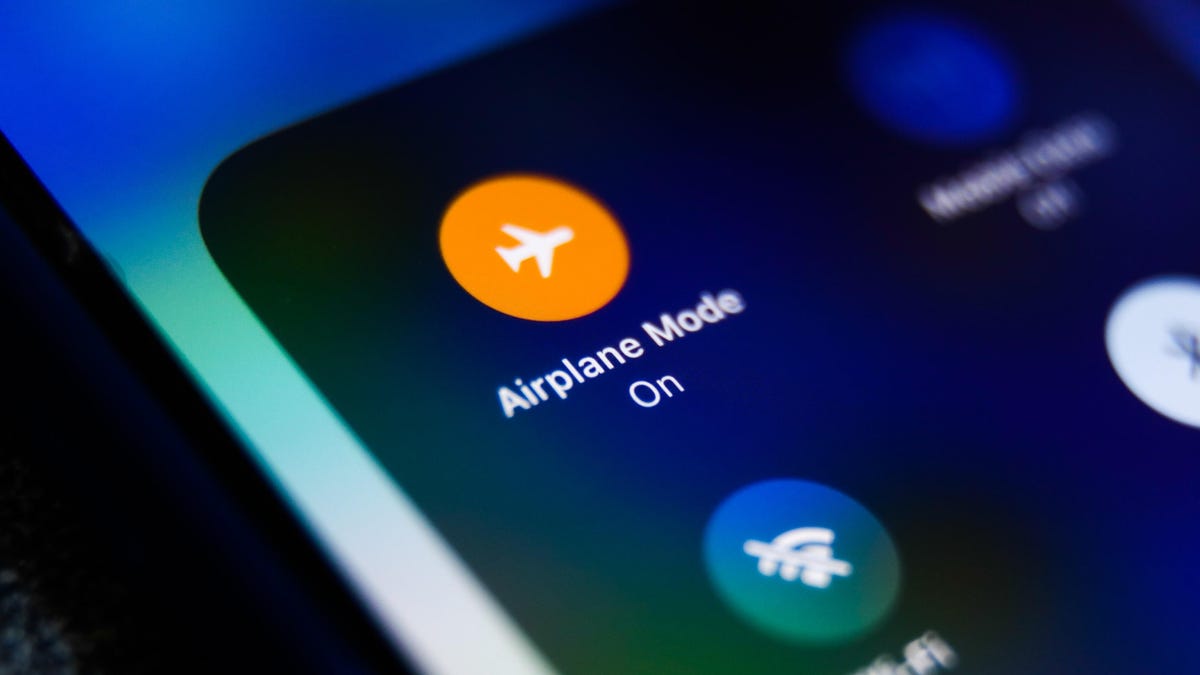- cross-posted to:
- [email protected]
- cross-posted to:
- [email protected]
The article is crap, but it is correct in that you don’t need to use airplane mode. I would, however, advise to still use it purely to preserve battery life of your device as otherwise it will very aggressively keep scanning for networks and drain it.
The article is crap,
It is Gizmodo after all
Yep. I do wish there was a toggle for the cellular radio by itself (rather than just mobile data). It’s annoying to have to go airplane mode then turn WiFi and BT back on.
On Android you do have that toggle
And if you turn wifi back on once, it’ll tell you that it can remember and always leave Wi-Fi on if you want.
Don’t even have to find the setting
iOS has it as well.
There is? I know the control center button for turning on/off mobile data, but I wasn’t aware there was a way other than airplane mode to prevent it from continuously scanning for networks.
The cell data button only disables data, but the airplane button disables the cellular radio entirely and doesn’t disable WiFi or Bluetooth. If you want WiFi and BT disabled, you need to tap them separately.
However… the airplane button remembers your last preference. If you tapped airplane and then disabled WiFi and BT, it will disable them next time you turn on airplane mode. If you last used airplane mode with WiFi and/or BT enabled, it will only disable the cell antenna.
That’s what airplane mode is. Try it out in the control center. It doesn’t disable my WiFi unless I had WiFi disabled when I last turned airplane mode off. Similar with Bluetooth except turning airplane off turns my Bluetooth on even if I had it off before.
Of course, an OS update or a reboot might reset the value of the previous WiFi state. 🤷♂️
Right, but the person I was replying to appears to be saying there is a toggle button that isn’t airplane mode to turn off the antenna, unless I’m misunderstanding.
There’s a separate cellular toggle yes.
deleted by creator
deleted by creator
I don’t but I’m running an older Lineage OS. Is it in the quick actions on the notifications pulldown?
Yes. It’s a simple toggle that can be added to the qyickbar: “airplane mode on/off”. And while it’s on, you can override it with individual settings, such as turning on bluetooth while everything remains off. Hazzle free and fast.
I use this feature a lot, as I fly very often, and I use bluetooth buds. I have filled my phone to the brim with various media to binge until touchdown. It helps conserve battery, as the radio doesn’t have to TX at full power while looking for a signal at FL500 in the middle of the Atlantic
deleted by creator
Weird. On iPhone it remembers if turned BT and WiFi on while Airplane mode is on and will only turn off the Cell antenna. Do that every time I travel.
Android does that too. At least the latest versions
deleted by creator
Meh - flights have USB ports now if your battery is low.
But that’s just a waste of electricity then? And battery health?
Unless you’re really into flying the effect is minimal
It also costs you nothing to disable it. And if everyone keeps it disabled for all their flights, it’s not minimal anymore. So I don’t really see the problem here.
Imagine the savings if all of those people just didn’t fly! lol
That doesn’t change that disabling cellular makes a difference, so I don’t see your point. Just because something’s not perfect, doesn’t mean it can’t make a difference.
It just makes such a tiny, insignificant difference that it really doesn’t matter one way or the other.
USB ports and outlets lol I haven’t been concerned about preserving my phone’s battery life while flying in a long time now lmao
How old are your phones? I don’t notice any “aggressive scanning” when I don’t have airplane mode on. The other user is not able to switch WiFi on in airplane mode, my last two phones did that no problem and they go like 4-5 years back.
Cell towers, without mountains/buildings blocking them, reach 10+ miles and airplanes don’t fly that high… so you are within range of towers while flying unless you’re over the ocean.
However, connecting to a tower that far away requires running the radio at maximum transmission power which absolutely kills your battery. Also the towers reject your phone’s attempt to connect because they are programmed to ignore distant connections when they know a dozen other towers are within a few miles of that tower. If you’re flying over remote areas where towers will accept any connection you might occasionally get enough signal to call 911 but i likely won’t be a usable data connection due to how far away you are.
Wether it shows a connection or not, your phone is still reaching out trying to connect and doing handshakes with towers on the ground.
Being inside a metal tube doesn’t help reception either.
“You have a reminder set for 5pm today,” my phone said.
“A reminder? What is it?” I asked.
“It’s a notification to ensure you don’t forget something, but that’s not important right now,” the phone replied.
Then I remembered I’d left it in Airplane! mode.
😆 It might be nice to have a phone that tells me “Remember, we’re all counting on you. Good luck.” Otoh it would probably keep calling me Shirley.
You can absolutely do that with a text to speech app and the app Tasker on Android.
It would have to be Leslie Neilson’s voice though.
Just have it play an mp3 clip of that scene in the movie.
“5pm today” can also get ambiguous if you’re flying across time zones.
If you keep in flying in the right direction, it could take more that 24 hours until you finally catch 5pm.
I think it’s still worth doing so your phone isn’t rapidly trying to connect and disconnect from nearby cell towers as you ascend and descend. Maybe there’s already protections in place for this case but it makes sense that it could add a lot of unnecessary strain on certain cell towers.
Not to mention the battery drain.
It’s been a long time since I’ve flown on a plane without at least a USB port to plug into, most have had full outlets to plug into lmao
It’s been a long time since my charger has actually stayed plugged into one of those worn-ass outlets in a plane.
Also, I don’t want to have to juggle multiple charging devices in the tiny cramped space where I’m already stressed and miserable.
Budget flights don’t have that kind of luxury.
I take short flights the whole year (like 6-10 per month) and I never had the USB chargers.
Those are like 1h flights tho
This is the primary reason I do it, although more for my battery life than the cell towers.
deleted by creator
I thought that’s what the Pico cells are for - each plane has a mini phone tower in it so phones happily connect to that instead of looking for ground stations
Uneducated writers thinking using phone during flight is the same thing as using phone on the ground. It’s not.
Phones won’t interfere with sensors and stuff on airplane. That much is true. However pilots need to communicate with all kinds of airport staff over FM radio and there, since it’s an analogue signal, phones can cause that familiar disruption. It won’t destroy equipment, but you will annoy pilots and might prolong departure time. Same thing when landing, you are coming from no signal zone and all of the sudden 100 phones starts talking at the same time when pilot is receiving instructions from the airport.
This is why you can talk during flight, but not takeoff.
I put my phone in airplane mode if for no other reason than if it’s constantly trying to connect to a signal or Wi-Fi, it drains the battery way faster.
Or that. Whatever the reason is, if one is being asked to disable phone, then disable it. There’s no reason to be an smartass and cause issues.
That disruption is from a 2G/GSM handset. Those networks were turned off a decade ago.
Pilot here. Still on the A320 series it’s obligatory to turn off the electrical devices for low visibility approaches (ILS Cat2/3) as aircraft’s navigational systems are not protected (at least certified) against RF interference.
Stupid article.
As of Jan 31, 2024 any planes still not hardened their altimeters to meet group 4 performance are restricted from flying auto land, I/II ILS ; and for the most part the airlines still flying them aren’t using those planes in US airspace. It doesn’t mean that there aren’t any flying just that when they are they’re restricted by the FAA as to how they can operate.
Many more planes outside of US airspace, and plenty of those are rather older than 2024.
The article was explicitly discussing US airspace, hence my comment about FAA regulations. No one is doubting that there are a significant number of planes elsewhere in the world, governed by other countries air authorities, that don’t need to deploy a fix to their altimeters to ensure no interference from outside radio sources. Also as we’re only ending the second month of the year I’d speculate that near 99% of the planes in operation are non 2024 models.
Also, it’s important to note that it’s not the phones on the planes as much as the 5G towers in range of airports that cause the issues. That’s why the rollout of 5G-C towers near airports were on hold for several years to allow airlines to retrofit/upgrade their radio altimeters.
General observation.
As people lose more and more real freedoms [lower real wages, more crowded roads, small retail stores swallowed up by mega-corps] they cling to false freedoms. They will keep those phones on, because it’s their right to, dammit!
HowardBealeRant.avi
3G has been turned off in a lot of places, but 2G is still very much used globally. It’s still the last fallback for phones to maintain basic texting and calling functionality. In many places emergency services also use it for e.g. emergency information via text message.
Can confirm. I own a pair of noise canceling earmuffs (meant for sport shooting; my dad was into guns). They’re completely unshielded so I can pick up interference from all sorts of signals. It’s fun to switch my phone between different networks to hear what 2G/3G/LTE/5G sounds like. I can even hear WiFi and find the dead spots in my house.
Point I’m making is that GSM is still sticking around here as a backup so when I drop my phone to 2G it sounds exactly the same as it does in this video.
GSM is still very much alive in many countries.
Last time I flew, there was no signal at all while flying. not even GPS!
There was GPS signal, it’s just by design that chips are not allowed to lock at above certain speed to prevent military use. But even if there’s no signal, mobile phone will try to find tower. If it doesn’t find one it will try increasing transmission power.
But even if there’s no signal, mobile phone will try to find tower. If it doesn’t find one it will try increasing transmission power.
Thus draining the phone’s battery much faster.
Same thing happens if you are camping in a remote location with weak or non-existent coverage.
Yup. Although it’s been a while since I found a place without mobile signal for camping. This planet is getting crowded.
That makes sense! Thanks
Next time you’re on a flight, download a GPS speedometer app and launch it right before takeoff. You’ll notice that it’ll accurately measure the plane’s speed up to around 500 MPH, before it suddenly stops giving you a speed readout.
Like the other person said, this is to prevent your average dude building a guided missile using an old phone they have lying around.
It’s a built-in security of the protocol. For accurate speed measurement device would need access to L2 frequencies, which carry encrypted data used for additional corrections, faster calculations, atmospheric conditions, etc. One can certainly get a location tracked through phone, but it’s not solely though GPS, it’s most likely combination of other positioning systems.
Probably would just use an IMU exactly as the plane itself already does for its own navigation.
They get a lock on the ground, synchronize the IMU with the Earth’s orbit, and they keep track of where they’ve moved from the origin, supplemented by GPS.
You are welcome. Although, like I said in other reply, speed is not the only limiting factor. It just makes it harder to find location. There are number of other things.
What? Every smartphone I can remember owning has gotten a GPS signal if I hold it up to the window. Plenty of planes have GPS on board too. If there is a speed lockout, a 737 isn’t enough to break that threshold.
Speed limit is indeed above speed that 737 can fly (see addendum), but it’s not only reason why GPS sometimes doesn’t lock. On the plane your phone doesn’t get assisted GPS, where rough location calculation is based on ground data like WIFI networks and GSM towers, so time to first fix takes significantly longer because your phone only has access to L1 frequencies. Since it takes a while, 30s for entire satellite message to be transmitted, it’s coordinates and the like, and there’s no help from ground stations for crude calculation combined with speed of the plane it all ends up contributing to a significantly longer time to first fix or perhaps even problematic fix in the first place.
So all in all, speed contributes to the problem. Yes signal was present at all times. And no, speed is not the sole factor but contributes a lot. GPS chips have improved quite a bit over the time so some old devices will definitely have a problem finding location on plane. Newer ones won’t, especially considering they have access to other networks like Galileo, GLONASS and BeiDou.
All GPS receivers capable of functioning above 60,000 ft (18 km) above sea level and 1,000 kn (500 m/s; 2,000 km/h; 1,000 mph), or designed or modified for use with unmanned missiles and aircraft, are classified as munitions (weapons)—which means they require State Department export licenses.[126] This rule applies even to otherwise purely civilian units that only receive the L1 frequency and the C/A (Coarse/Acquisition) code.
Edit: What airplanes have on board, is access to different frequency which your device doesn’t. It’s not comparable.
There’s no way there was no GPS, maybe your phone was trying to base your location with antennas and not GPS
Last time I flew, there was no signal at all while flying.
There’s a number of factors that lead to that.
-
The cell base station antennas have a relatively narrow vertical beamwidth and are typically aimed a few degrees below horizontal. (Aircraft tend not to operate at that altitude)
-
usable range of each cell base stations is typically <50 km.
-
Cell base stations are optimized for communicating with mobiles moving less than 90km/h.
Given all that, if you happen to get a signal, you’ll be handing off between towers far too fast and too frequently for the network to reliably deal with.
-
I used to turn Airplane Mode on during my LSD trips many years ago, pretty useful.
I haven’t heard drifting referred to as limited slip differential trips before, but that’s good that you aren’t texting and drifting.
More importantly, you don’t need to be on an airplane to use airplane mode.
Airplane mode is a blessing. If the OS is trustworthy (i.e. FOSS Android) then it actually works, it turns off that crappy unprivate cell connection and you have anonymous Wifi only.
It saves battery and you can use your phone without anyone being able to track you easily.
Btw Google hides the GPS quicksettings toggle for a reason, edit the shortcuts and add it.
… What? You think WiFi is anonymous?
It can sometimes triangulate you better than the cell towers.
WiFi isn’t as safe as they apparently think it is lol
If the SSID you connect to is unique enough, there’s a site that can literally pinpoint your location. If you have any other SSIDs around you, it’s basically guaranteed. That’s why there’s a bunch of apps that log the SSIDs around you, to get your location without having to ask.
That’s not even considering the entire rest of WiFi that’s not anonymous
If you randomize your Mac address (which is default on GrapheneOS and Fedora now) you are pretty anonymous to the wifi network.
Of course websites see where you are, they always do that. Use Tor or a VPN.
Ive always forgotten to set this anyway. No planes taken down so far (but it will drain your battery)
Why don’t they just call it “avoiding people” mode instead
All the comments about technical details and practical details…
Are we forgetting that when dealing with millions of people, plus bureaucracy, in a potential death risk, it’s worth being slow and cautious about relaxing former safety rules.
That was my understanding, that once upon a time it was legitimately feared that mobile phones could caused accidents (and thought they had indeed caused one). So, besides the other issues people have highlighted in the comments, to walk back from the safety rule of turn-them-off is a slow process.
Commercial air travel is not known for going, “ah, it’s probably fine, don’t worry;” except in the case of emergency exit door bolts.
Also, I’d like to add:
You don’t need to use airplane mode on airplanes
… Please do follow the rules, and do what the cabin crew ask you to do. Otherwise, even if you don’t directly endanger the plane, you make it harder for them to do their jobs and keep everyone safe.
I feel like this has been common knowledge. Airplane mode is more about “we don’t want some asshole talking to their client on the phone while we are trying to do the safety briefing and take off”
Then why flight attendant says “switch your devices to flight mode”? It was a week ago in domestic european flight.
They usually only ask you to do so for take off and landing. Also based on experience from a European flight
I was on a domestic flight in Europe two months ago and there was no such announcement. They were probably just being nice and saving you some battery.
But there is absolutly no reason to turn it off because of any saftey concerns with the plane.
Last time i forgot and the phone connected to “aeromobile”. Would have cost me a packet if i had left roaming data on
In my country, 2G phones could interfere with radios with that da-dada-da-dada sound. I know people who have personally had that happen to them while trying to land airliners and it made listening to ATC more difficult.
I don’t think it’s an issue anymore though.
That’s because phones and airplanes were operating on the same frequency. They don’t do that anymore… in part because there’s a dozen phones on every flight that haven’t been put in airplane mode.
No they don’t. GSM is all over the place with frequency, but it never goes down to 118-137 MHz which is where air traffic sits. It’s just that mobile phones will increase transmission power to reach cell towers and that can produce that annoying disturbance. Phone won’t mess up instruments, just annoy people trying to talk and get your ass safely from the ground.
Definitely not an issue in the US anymore. T-Mobile is the last carrier to support 2G and they’re shutting that down in April this year. I think most Android phones explicitly disable 2G now too because it’s not secure.
Mine has it disabled, but available if I want to enable it (with a security warning.)
Mine had it disabled by default, but still available for emergency calls, and the option to enable it.
Thanks for rendering my little private rebellion worthless. It’s all I had left.























